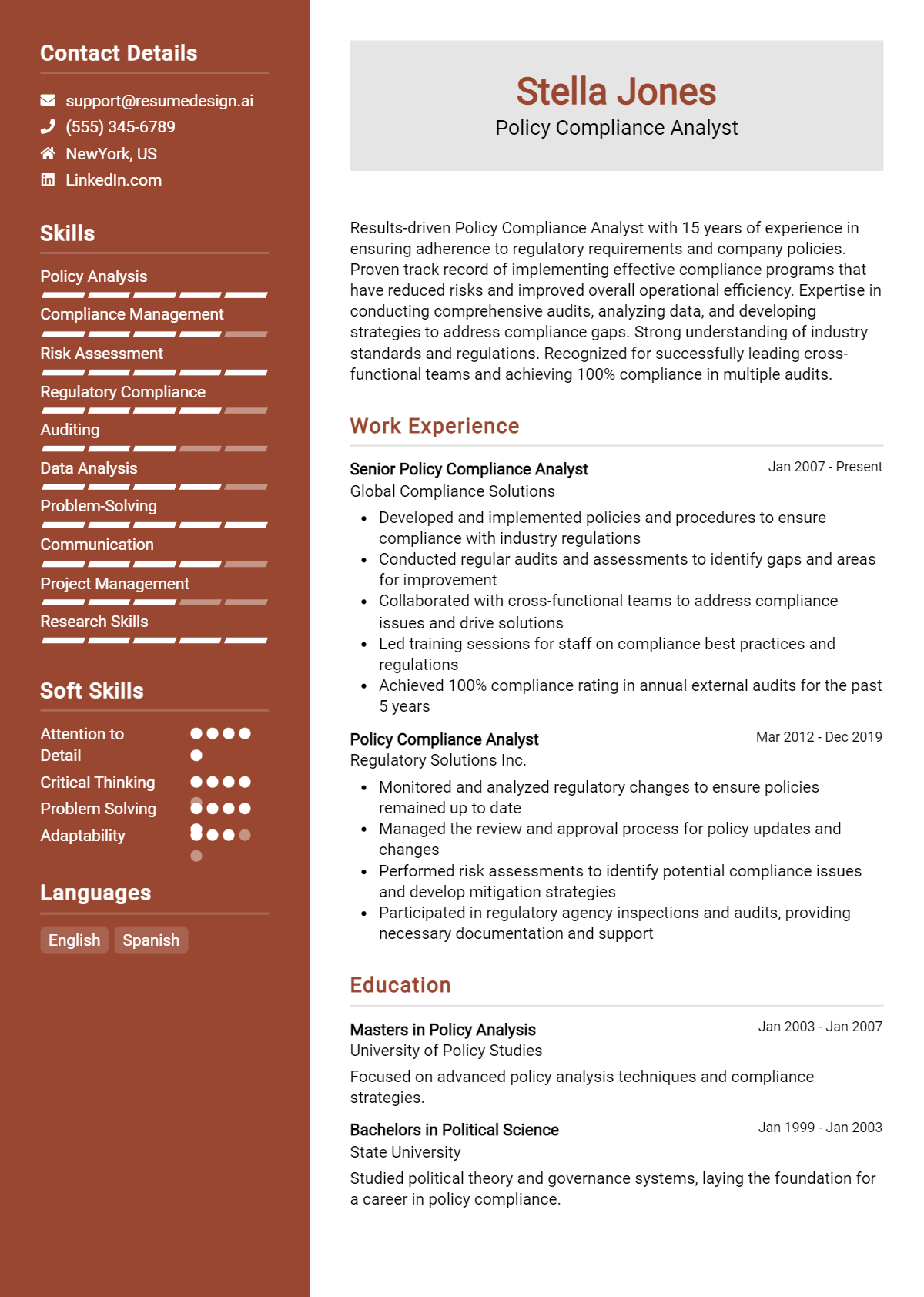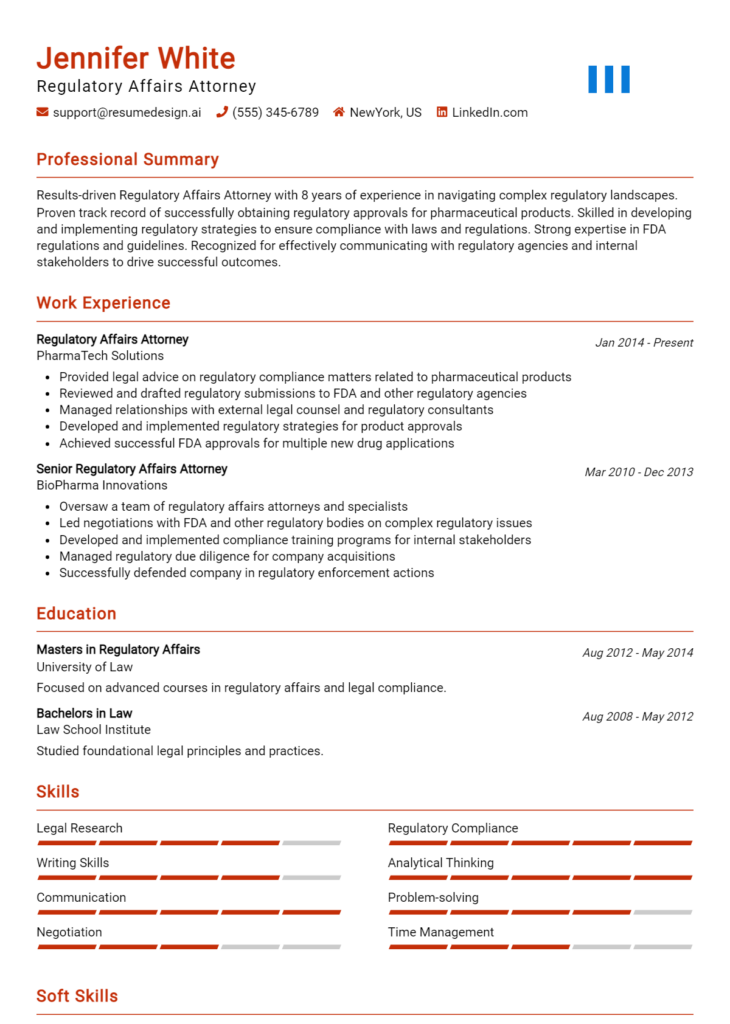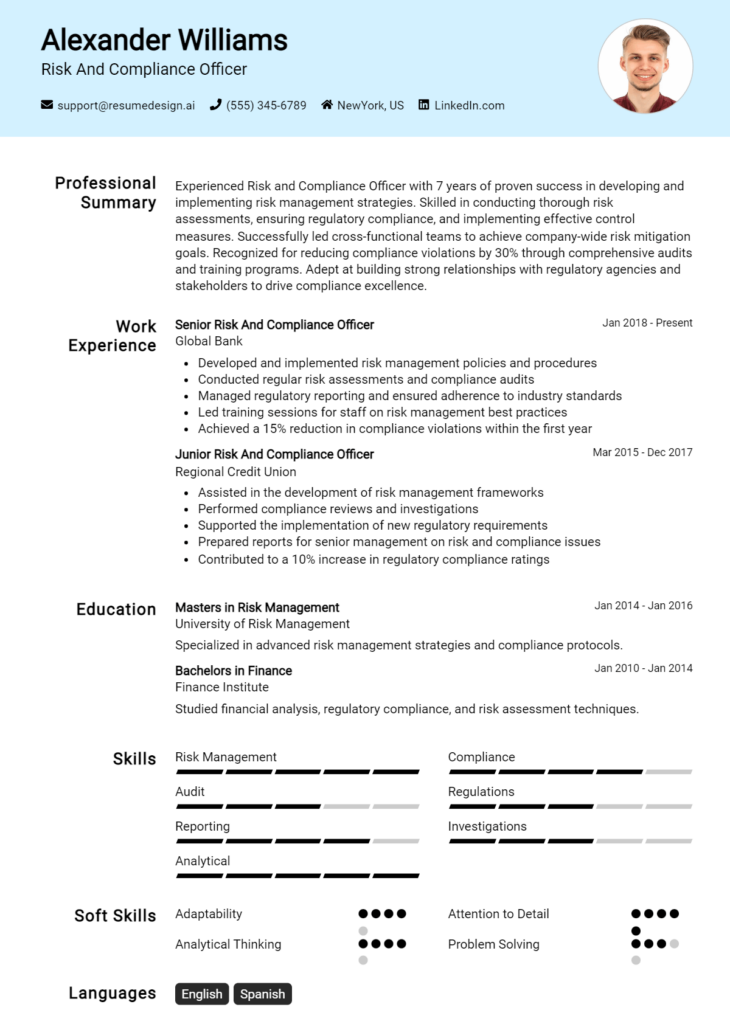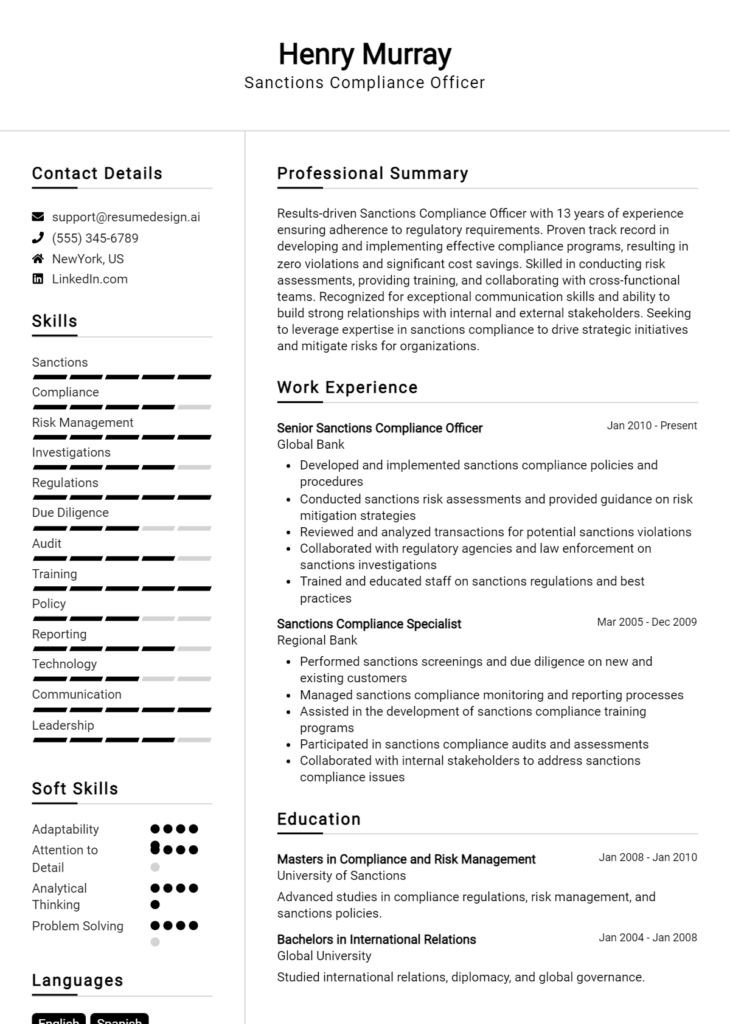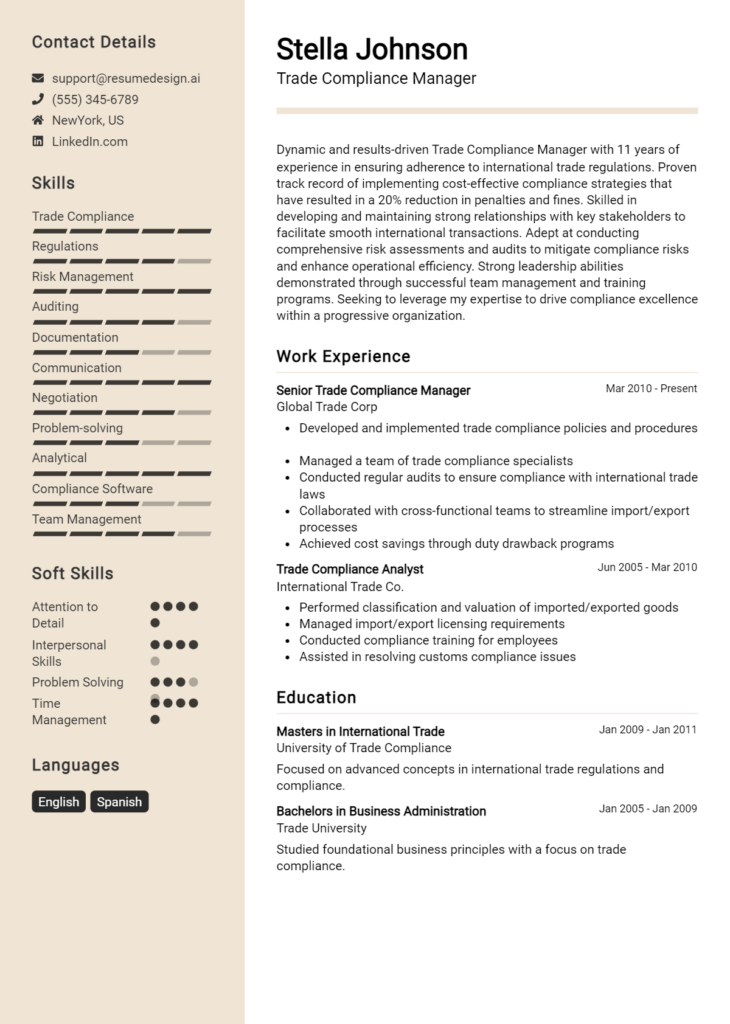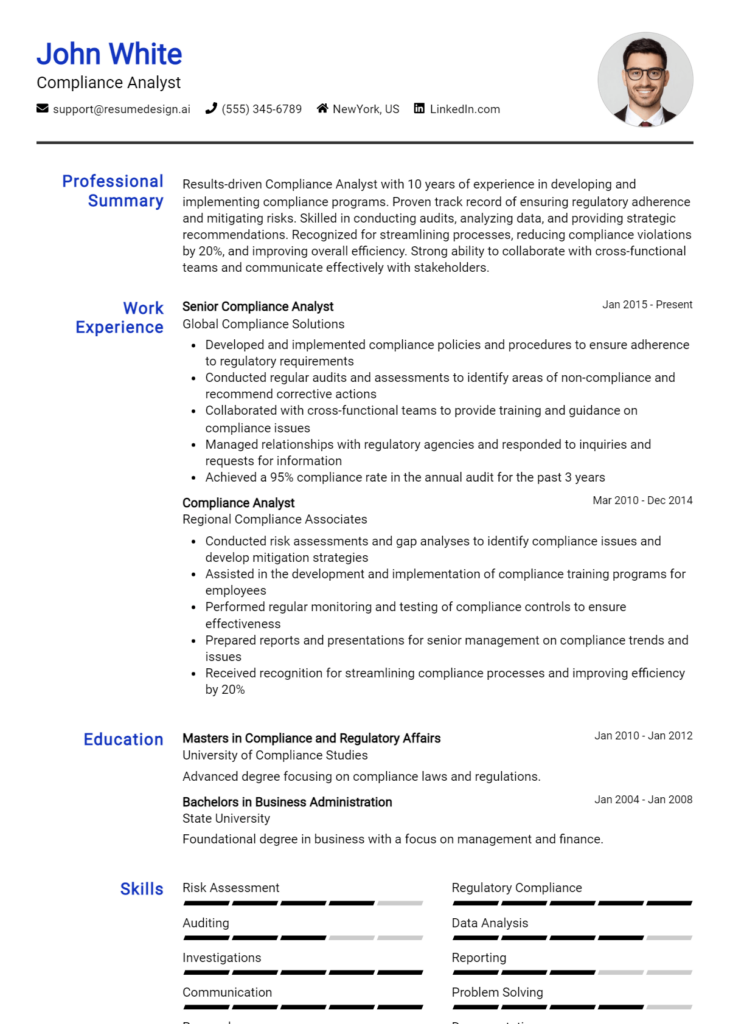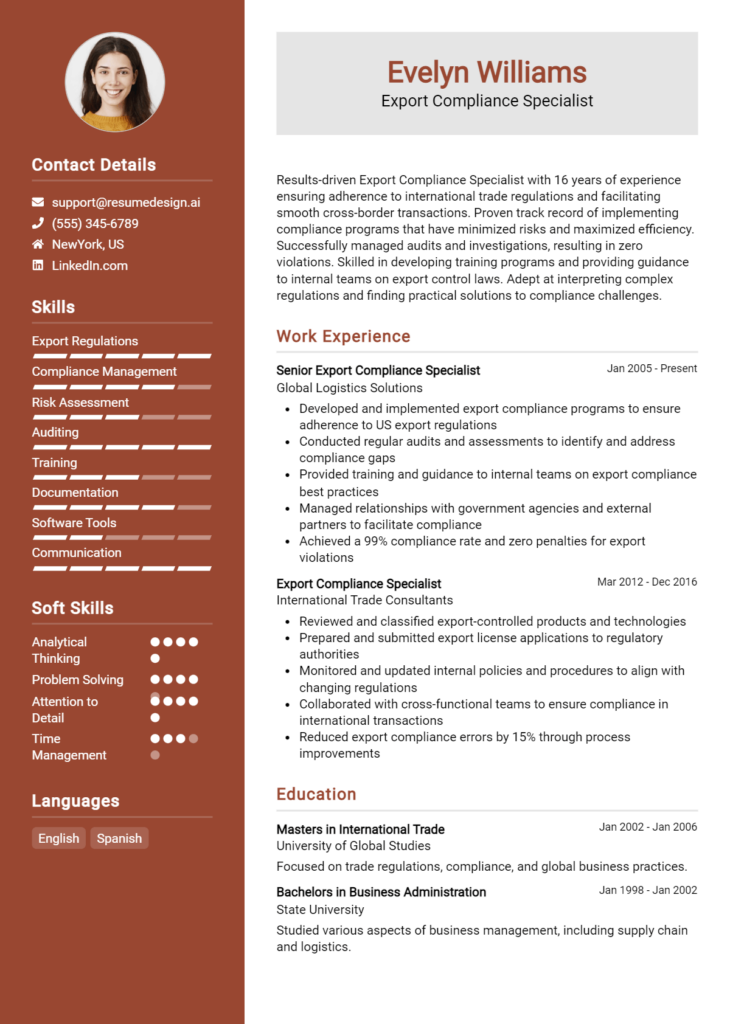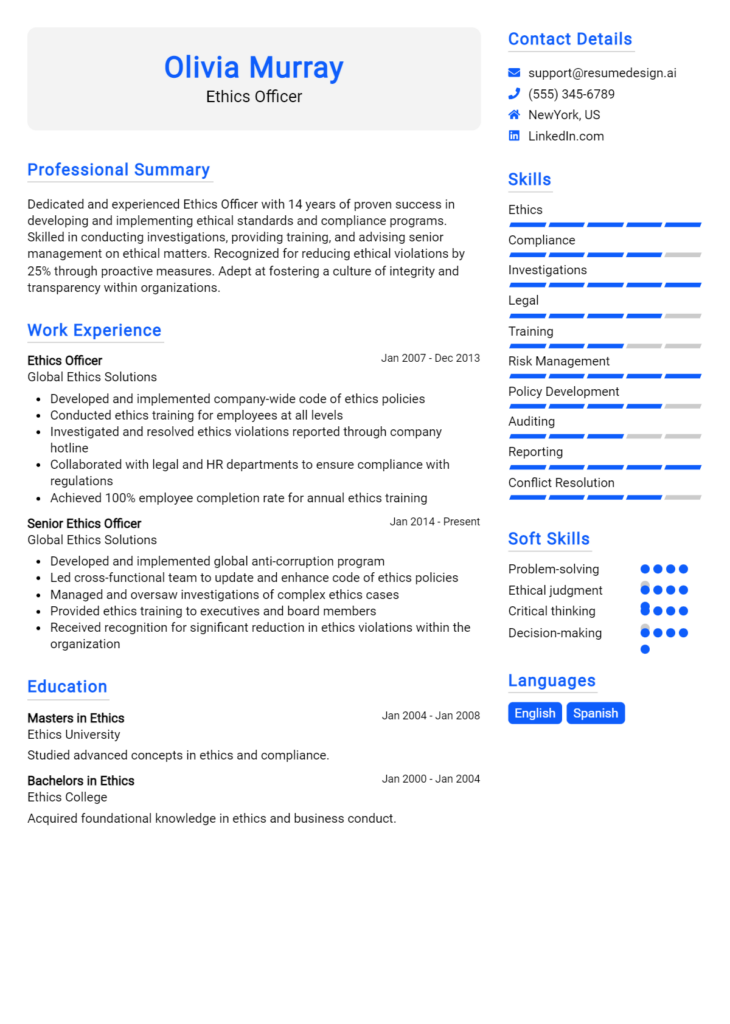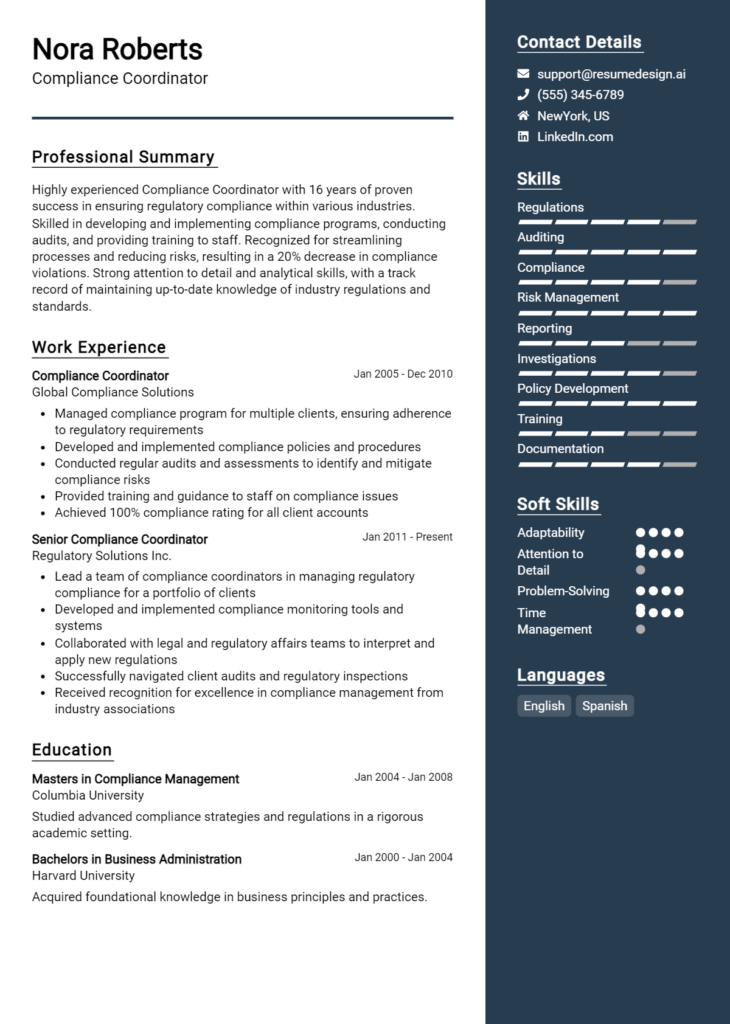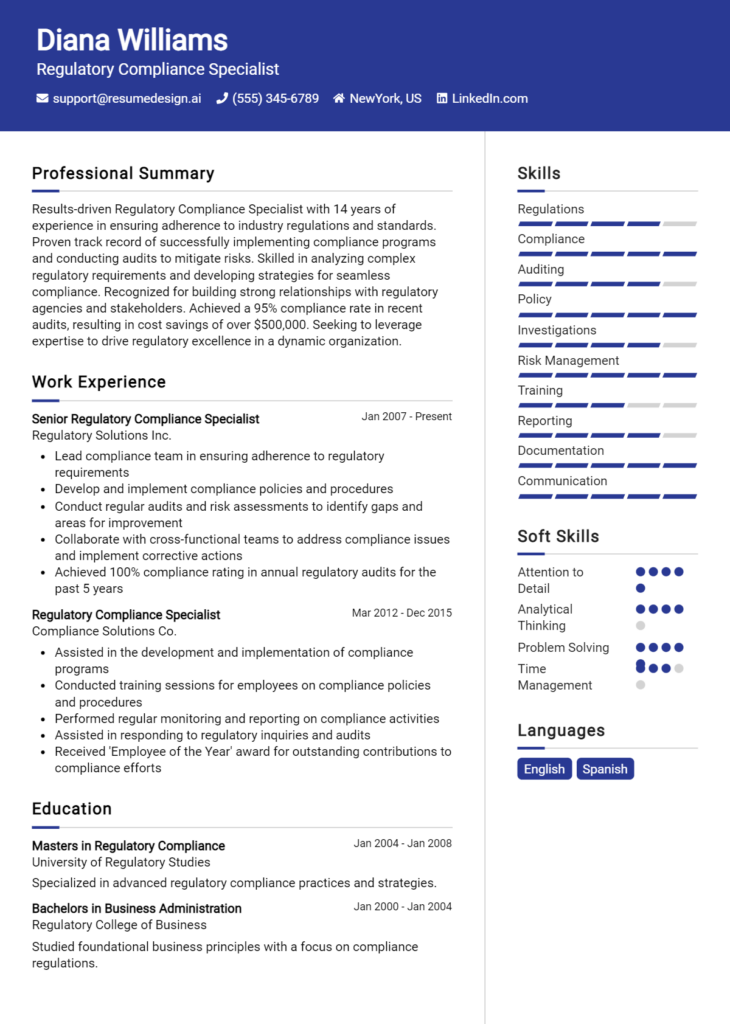Policy Compliance Analyst Core Responsibilities
A Policy Compliance Analyst plays a crucial role in ensuring that organizations adhere to internal policies and external regulations. Key responsibilities include conducting audits, analyzing compliance data, and collaborating with various departments to implement policy changes. This position necessitates strong technical skills, operational understanding, and excellent problem-solving abilities. These competencies are vital in achieving organizational goals and minimizing risk. A well-structured resume that highlights these qualifications can effectively demonstrate a candidate's fit for the role.
Common Responsibilities Listed on Policy Compliance Analyst Resume
- Conduct regular compliance audits and assessments.
- Analyze and interpret regulatory requirements and policies.
- Collaborate with cross-functional teams to ensure adherence to compliance standards.
- Develop and maintain compliance documentation and reports.
- Provide training and support to staff on compliance-related matters.
- Monitor industry trends and changes in regulations.
- Identify compliance risks and recommend mitigation strategies.
- Assist in the development of compliance policies and procedures.
- Conduct investigations of compliance violations and recommend corrective actions.
- Ensure timely reporting of compliance issues to management.
- Support the preparation for regulatory audits and examinations.
High-Level Resume Tips for Policy Compliance Analyst Professionals
In today's competitive job market, a well-crafted resume is essential for Policy Compliance Analyst professionals looking to make a strong first impression on potential employers. Your resume serves as a reflection of your skills, achievements, and understanding of compliance regulations, showcasing your ability to navigate the complexities of policy adherence. A compelling resume not only highlights your qualifications but also tells your professional story in a way that resonates with hiring managers. This guide will provide practical and actionable resume tips specifically tailored for Policy Compliance Analyst professionals, ensuring you stand out in a crowded field.
Top Resume Tips for Policy Compliance Analyst Professionals
- Tailor your resume for each application by aligning your skills and experiences with the specific job description.
- Highlight your relevant experience in compliance, risk management, or regulatory analysis to demonstrate your expertise.
- Quantify your achievements by including metrics, such as the percentage of compliance improvement or successful audits completed.
- Emphasize industry-specific skills like knowledge of regulations, data analysis, and policy development relevant to the role.
- Include relevant certifications or training in compliance, risk management, or related fields to bolster your qualifications.
- Utilize action verbs to describe your responsibilities and accomplishments, making your contributions clear and impactful.
- Incorporate keywords from the job posting to enhance your resume's compatibility with Applicant Tracking Systems (ATS).
- Maintain a clean, professional format that enhances readability and highlights your most important information effectively.
- Showcase your ability to work collaboratively with cross-functional teams, as teamwork is often crucial in compliance roles.
- Consider including a summary statement that encapsulates your overall experience and what you bring to the role.
By implementing these tips, you can significantly increase your chances of landing a job in the Policy Compliance Analyst field. A targeted and well-structured resume not only presents you as a qualified candidate but also demonstrates your attention to detail and commitment to compliance, qualities that are highly valued in this industry.
Why Resume Headlines & Titles are Important for Policy Compliance Analyst
In the competitive field of policy compliance analysis, crafting a compelling resume is essential for standing out among a pool of candidates. A well-thought-out resume headline or title serves as the first impression, immediately grabbing the attention of hiring managers and summarizing a candidate's key qualifications in one impactful phrase. It should be concise, relevant, and directly aligned with the job being applied for, effectively setting the tone for the rest of the resume. A strong headline not only highlights the applicant's expertise but also demonstrates their understanding of the role's requirements and the organization's goals.
Best Practices for Crafting Resume Headlines for Policy Compliance Analyst
- Keep it concise: Aim for one impactful phrase that captures your expertise.
- Be role-specific: Tailor your headline to reflect the specific requirements of the Policy Compliance Analyst position.
- Highlight key qualifications: Include your most relevant skills, certifications, or experiences.
- Use action-oriented language: Start with strong action verbs to convey proactivity.
- Avoid jargon: Use clear and straightforward language that can be easily understood.
- Incorporate relevant keywords: Utilize terms from the job description to enhance visibility in applicant tracking systems.
- Showcase accomplishments: If possible, include quantifiable achievements that demonstrate your impact in previous roles.
- Match the company culture: Align your tone and style with the organization's values and mission.
Example Resume Headlines for Policy Compliance Analyst
Strong Resume Headlines
Detail-Oriented Policy Compliance Analyst with 5+ Years of Experience in Regulatory Reporting
Results-Driven Compliance Specialist Skilled in Risk Assessment and Policy Development
Certified Policy Compliance Analyst with Proven Track Record in Ensuring Regulatory Adherence
Weak Resume Headlines
Just Another Compliance Analyst
Experienced Worker Looking for a Job
The strong headlines are effective because they are specific, highlighting relevant experience and expertise that directly relate to the Policy Compliance Analyst role. They convey a sense of professionalism and confidence, making a strong case for the candidate's abilities. In contrast, the weak headlines fail to impress as they lack specificity and do not communicate any unique qualifications or skills. Such generic titles do little to differentiate the candidate from others, ultimately diminishing their chances of capturing the attention of hiring managers.
Writing an Exceptional Policy Compliance Analyst Resume Summary
A well-crafted resume summary is crucial for a Policy Compliance Analyst as it serves as the first impression to hiring managers. This brief yet impactful section quickly captures attention by showcasing key skills, relevant experience, and significant accomplishments that align with the job role. In a competitive job market, a strong summary can differentiate a candidate from others, emphasizing their qualifications and tailored fit for the position. It should be concise, engaging, and directly aligned with the specific requirements of the job the candidate is applying for, ensuring that it resonates with the priorities of the employer.
Best Practices for Writing a Policy Compliance Analyst Resume Summary
- Quantify Achievements: Use specific numbers or percentages to highlight your successes and contributions.
- Focus on Relevant Skills: Emphasize skills that directly relate to the compliance and analysis aspects of the job.
- Tailor to the Job Description: Customize your summary to reflect the language and requirements of the position you’re applying for.
- Highlight Key Accomplishments: Mention significant projects or achievements that demonstrate your effectiveness in previous roles.
- Keep it Concise: Aim for 2-4 sentences that deliver maximum impact without being overly verbose.
- Use Action Verbs: Start with strong action verbs to convey proactivity and engagement in your work.
- Showcase Industry Knowledge: Include specific compliance regulations or standards you are familiar with to establish credibility.
- Maintain Professional Tone: Ensure that the summary is professional and aligns with the expectations of a compliance-focused role.
Example Policy Compliance Analyst Resume Summaries
Strong Resume Summaries
Results-driven Policy Compliance Analyst with over 5 years of experience in regulatory compliance and risk management. Successfully led compliance audits that reduced non-compliance incidents by 30%, ensuring adherence to industry standards and minimizing potential liabilities.
Detail-oriented Policy Compliance Analyst skilled in developing and implementing compliance frameworks. Achieved a 25% improvement in policy adherence across the organization by creating targeted training programs and streamlined reporting processes.
Experienced Policy Compliance Analyst with a proven track record of analyzing and interpreting complex regulations. Spearheaded a compliance initiative that resulted in a 40% reduction in regulatory breaches over two years, contributing to a safer and more compliant workplace.
Proactive Policy Compliance Analyst with expertise in data analysis and compliance monitoring. Successfully identified risk areas and implemented corrective actions, leading to a 15% increase in efficiency in compliance reporting and documentation processes.
Weak Resume Summaries
Experienced analyst with a background in compliance and policy work. I have worked in various roles and am looking for new opportunities.
Detail-oriented professional seeking a position in policy compliance. I have skills that can be useful in this field and am eager to contribute to a team.
The examples above illustrate the characteristics of strong and weak resume summaries effectively. Strong summaries are specific, quantifiable, and directly related to the responsibilities of a Policy Compliance Analyst, showcasing achievements and relevant skills that demonstrate a candidate's value. In contrast, weak summaries lack detail, fail to highlight quantifiable achievements, and come across as generic, which does not capture the attention of hiring managers or convey a clear sense of the candidate's qualifications.
Work Experience Section for Policy Compliance Analyst Resume
The work experience section of a Policy Compliance Analyst resume serves as a critical component that demonstrates the candidate's relevant technical skills and their capacity to manage teams effectively while delivering high-quality products. This section not only highlights the candidate's experience in navigating complex compliance issues but also showcases their ability to implement policy changes and ensure adherence to industry standards. Quantifying achievements, such as improvements in compliance rates or cost savings, is essential in providing tangible evidence of the candidate's impact in previous roles. Aligning this experience with industry standards further strengthens the resume, making it more appealing to potential employers.
Best Practices for Policy Compliance Analyst Work Experience
- Clearly outline your technical skills relevant to compliance analysis, such as knowledge of regulations and compliance frameworks.
- Quantify your achievements with specific metrics, like percentage improvements or cost reductions.
- Highlight collaborative projects that demonstrate your ability to work within a team and engage with stakeholders.
- Use action verbs to convey your contributions and responsibilities effectively.
- Tailor your work experience to align with the job description and industry standards.
- Include specific tools, software, or methodologies you have utilized in your roles.
- Showcase any leadership roles or initiatives you took to improve compliance processes.
- Provide context for your achievements to demonstrate their significance in your previous organizations.
Example Work Experiences for Policy Compliance Analyst
Strong Experiences
- Led a cross-departmental team to implement a new compliance tracking system, resulting in a 30% improvement in compliance reporting accuracy.
- Developed and executed a training program for staff on regulatory updates, increasing overall compliance knowledge by 40% as measured by post-training assessments.
- Established a quarterly audit process that identified and mitigated potential compliance risks, saving the company approximately $250,000 annually in potential fines.
- Collaborated with IT and legal teams to enhance data protection policies, achieving a successful compliance audit with zero findings.
Weak Experiences
- Worked on compliance-related tasks without specifying the nature or outcomes of the work.
- Assisted in audits and compliance checks, but did not quantify contributions or results.
- Participated in team meetings regarding compliance issues without detailing specific responsibilities or actions taken.
- Involved in policy review processes, but provided no context on the impact of those reviews.
The examples provided illustrate the distinction between strong and weak experiences. Strong experiences are characterized by quantifiable outcomes, specific contributions to team efforts, and clear demonstrations of technical expertise and leadership. In contrast, weak experiences lack detail, measurable results, and fail to convey the candidate's role or impact, ultimately making them less compelling to potential employers.
Education and Certifications Section for Policy Compliance Analyst Resume
The education and certifications section of a Policy Compliance Analyst resume plays a crucial role in showcasing the candidate's academic background and professional qualifications. This section not only highlights relevant degrees and industry-recognized certifications but also demonstrates the candidate's commitment to continuous learning and expertise in policy compliance. By providing details on relevant coursework, certifications, and any specialized training, candidates can enhance their credibility and align themselves more closely with the specific requirements of the job role, making a compelling case for their suitability in the field.
Best Practices for Policy Compliance Analyst Education and Certifications
- Prioritize relevant degrees in fields such as Public Policy, Law, Business Administration, or Compliance.
- Include industry-recognized certifications such as Certified Compliance and Ethics Professional (CCEP) or Certified Regulatory Compliance Manager (CRCM).
- Detail relevant coursework that aligns with policy compliance, such as Risk Management, Regulatory Affairs, or Ethics in Governance.
- Highlight any specialized training in compliance software, data analysis, or policy analysis methodologies.
- Use clear and concise formatting to ensure easy readability and accessibility of information.
- Update the section regularly to include any new certifications or educational achievements.
- Consider including a brief description of projects or research that demonstrates practical application of knowledge.
- Always ensure that the listed qualifications are current and applicable to the position being applied for.
Example Education and Certifications for Policy Compliance Analyst
Strong Examples
- Bachelor of Arts in Public Policy, University of XYZ, 2020
- Certified Compliance and Ethics Professional (CCEP), 2021
- Relevant Coursework: Risk Management, Regulatory Compliance, and Ethics in Governance
- Master of Science in Regulatory Affairs, ABC University, Expected Graduation: 2023
Weak Examples
- Bachelor of Arts in English Literature, University of ABC, 2015
- Certification in Basic First Aid, 2020
- Relevant Coursework: Creative Writing and Poetry
- High School Diploma, 2010
The strong examples are considered effective because they directly relate to the skills and knowledge required for a Policy Compliance Analyst role, showcasing relevant degrees and certifications that enhance the candidate's qualifications. In contrast, the weak examples illustrate a lack of relevance to the position; they include degrees and certifications that do not support the necessary competencies for policy compliance work, ultimately undermining the candidate's suitability for the role.
Top Skills & Keywords for Policy Compliance Analyst Resume
As a Policy Compliance Analyst, possessing the right skills is crucial to effectively navigate the complexities of regulatory frameworks and organizational policies. A well-crafted resume that highlights both hard and soft skills not only demonstrates your qualifications but also showcases your ability to adapt to the dynamic nature of compliance work. These skills are essential for analyzing policies, ensuring adherence to regulations, and fostering a culture of compliance within an organization. By carefully curating your resume with relevant skills, you can position yourself as a strong candidate in this competitive field.
Top Hard & Soft Skills for Policy Compliance Analyst
Soft Skills
- Attention to Detail
- Critical Thinking
- Problem-Solving
- Effective Communication
- Time Management
- Adaptability
- Team Collaboration
- Analytical Mindset
- Ethical Judgment
- Interpersonal Skills
- Conflict Resolution
- Organizational Skills
- Research Skills
- Emotional Intelligence
- Negotiation Skills
Hard Skills
- Knowledge of Regulatory Frameworks
- Risk Assessment Techniques
- Policy Development and Implementation
- Data Analysis and Interpretation
- Compliance Management Systems
- Audit and Review Processes
- Familiarity with Legal Terminology
- Statistical Analysis
- Proficiency in Compliance Software
- Report Writing
- Project Management
- Understanding of Industry Standards
- Training and Development
- Incident Management
- Document Control Systems
- IT Skills related to Compliance
- Understanding of Business Operations
- Familiarity with Data Privacy Laws
By focusing on these essential skills in your resume and work experience, you can effectively convey your capability to fulfill the role of a Policy Compliance Analyst and contribute to your potential employer's success.
Stand Out with a Winning Policy Compliance Analyst Cover Letter
I am writing to express my interest in the Policy Compliance Analyst position at [Company Name], as advertised on [Job Portal/Website]. With a solid background in regulatory compliance and risk management, coupled with my analytical skills and attention to detail, I am confident in my ability to contribute effectively to your team. My experience in monitoring and implementing compliance policies aligns well with your organization's commitment to maintaining high standards of integrity and accountability.
In my previous role at [Previous Company Name], I successfully developed and executed compliance training programs that improved staff awareness and adherence to regulatory guidelines. My responsibilities included conducting thorough audits and assessments to identify potential risks and ensuring that all company policies were up to date with the latest regulations. I collaborated closely with cross-functional teams to streamline compliance processes, which resulted in a 20% increase in overall compliance adherence. I believe that my proactive approach and ability to communicate complex compliance issues in an understandable manner will be an asset to [Company Name].
I am particularly drawn to this role at [Company Name] because of your commitment to fostering a culture of compliance and ethical practices. I admire your innovative approach to integrating compliance into business operations and believe that my skills in data analysis and policy evaluation can help enhance your initiatives. I am eager to bring my expertise in compliance frameworks and my passion for ensuring organizational adherence to policies to your esteemed company.
Thank you for considering my application. I look forward to the possibility of discussing how my background, skills, and enthusiasms align with the goals of [Company Name]. I am excited about the opportunity to contribute to your team and help maintain the high standards of compliance that your organization is known for.
Common Mistakes to Avoid in a Policy Compliance Analyst Resume
When crafting a resume for a Policy Compliance Analyst position, it's crucial to highlight relevant skills and experience effectively. However, many candidates make common mistakes that can hinder their chances of standing out to hiring managers. Understanding these pitfalls can help you create a resume that not only showcases your qualifications but also aligns with the specific requirements of the role. Here are some common mistakes to avoid:
Generic Objective Statements: Using a vague or generic objective that doesn't specify your goals or how you can contribute to the organization can make your resume forgettable. Tailor your objective to reflect the specific role you're applying for.
Lack of Quantifiable Achievements: Failing to include measurable accomplishments can weaken your resume. Use specific metrics and examples to demonstrate how your actions led to improvements in compliance or policy adherence.
Overloading with Technical Jargon: While it's important to demonstrate your knowledge, overwhelming your resume with excessive technical terms can alienate readers. Aim for clarity and ensure that your expertise is understandable to a broader audience.
Ignoring Relevant Skills: Not highlighting skills that are directly relevant to policy compliance, such as risk assessment, regulatory knowledge, and analytical abilities, can be a significant oversight. Make sure to align your skills with the job description.
Using a One-Size-Fits-All Format: A resume that doesn’t consider the specific requirements of the Policy Compliance Analyst role can come across as impersonal. Customize your resume layout and content to fit the position and company culture.
Neglecting Soft Skills: While technical skills are essential, overlooking soft skills like communication, problem-solving, and teamwork can be detrimental. These skills are often crucial for a Policy Compliance Analyst who needs to liaise with various stakeholders.
Too Much Focus on Job Duties: Simply listing job responsibilities without highlighting how you exceeded expectations or the impact you made can make your resume fall flat. Focus on accomplishments rather than just duties.
Formatting Issues: A cluttered or overly complex resume format can detract from your content. Use clear headings, bullet points, and consistent font styles to ensure your resume is easy to read and visually appealing.
Conclusion
As a Policy Compliance Analyst, your role is crucial in ensuring that an organization's policies adhere to regulatory standards and internal guidelines. Key responsibilities often include conducting audits, analyzing compliance risks, and providing recommendations for improvement. A successful Policy Compliance Analyst must possess strong analytical skills, attention to detail, and a thorough understanding of relevant laws and regulations.
In summary, this article highlighted the essential duties and skills required for a Policy Compliance Analyst. It emphasized the importance of staying updated with changing regulations and the impact of compliance on organizational integrity.
Now is the perfect time to review your resume to ensure it effectively showcases your qualifications for this vital role. Consider utilizing tools such as resume templates to create a polished and professional presentation of your experience. If you need assistance, try the resume builder for a more guided approach. Additionally, reviewing resume examples can provide inspiration and help you understand how to highlight your strengths. Don’t forget to craft a compelling introduction with cover letter templates to accompany your application. Take action today to enhance your career prospects as a Policy Compliance Analyst!

